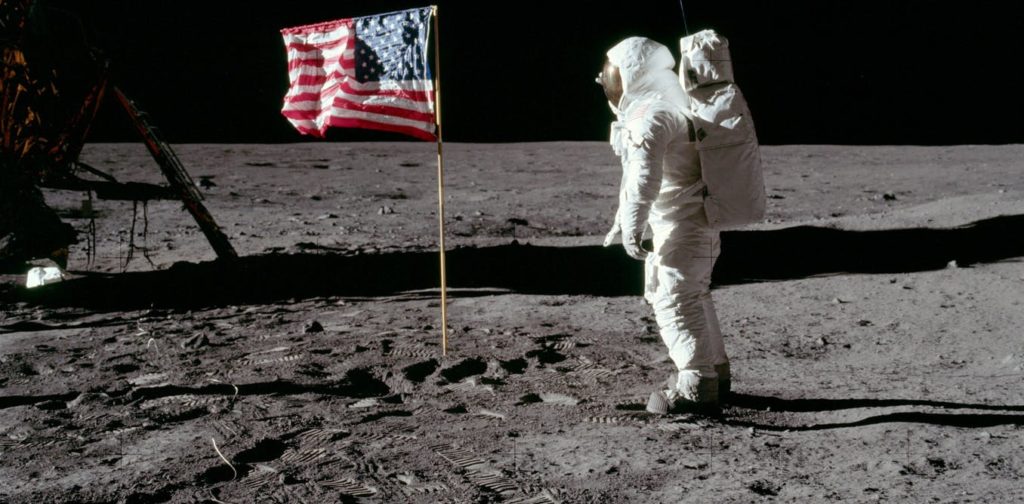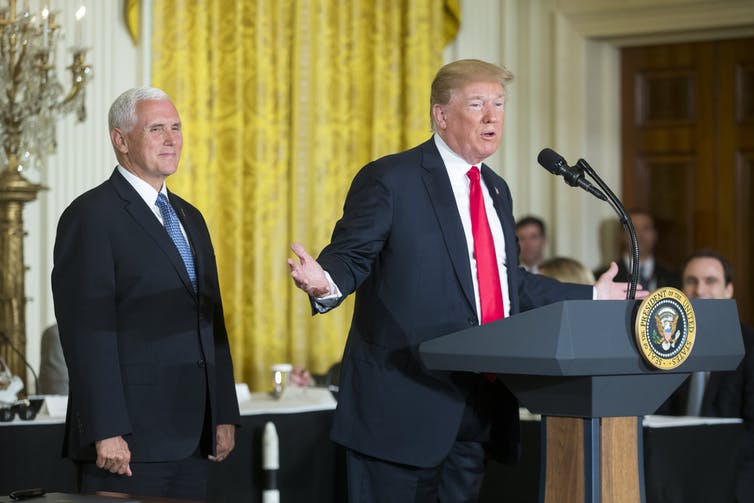Donald Trump’s Space Force: The Dangerous Militarisation of Outer Space
ANGLO AMERICA, ENERGY, WEAPONS OF MASS DESTRUCTION, MILITARISM, ENVIRONMENT, TECHNOLOGY, SCIENCE, 2 Jul 2018
Gbenga Oduntan – The Conversation
25 Jun 2018 – In a recent speech, President Donald Trump announced a new policy for the American space programme. It is time, he argued, for America to create a “Space Force”. As ever, the policy announcement was full of glittering ideas but short on detail, largely unspecific and even inaccurate. What we do know is that this would be a new and separate military command, “equal” to the American Airforce. But like much of Trumpian vision, superlative expressions shroud reality and do great injustice to the serious issues at stake.
We should all be concerned by the prospect of the nuclearisation and militarisation of outer space. It is crucial for world, and perhaps even intergalactic, peace that the legality of his plans are subject to the fiercest domestic and international scrutiny. At the moment it is unclear how they could possible fit in with existing international legal frameworks.
Militarised space
America has hardly ever disguised its view of space as an extension of military power. The US already has an Air Force Space Command, created by Ronald Reagan in 1982, which is dedicated to using space-based assets to aid its flights, fights, and to win in air, space and cyberspace. Reagan also introduced the “Star Wars” programme and George W. Bush unsuccessfully tried to resurrect it through the Son of Star Wars project. Both were touted as futuristic space-based ballistic missile interceptor programmes. But aside from the fact that they were technically impossible at the time, they also constituted a frontal assault on a previous anti-ballistic missile treaty between the US and the Soviet Union.
Trump’s most recent vision is actually a rehash of existing programmes. The idea of creating a new branch of the military called the “Space Corp” was already in the 2017 National Defence Authorisation Act, which emerged from discussions long predating the current administration. But in the end the plans were dropped because congressional negotiators refused to fund them.
And America is not alone in the quest for a military presence in space. All modern armies rely on space-based applications, such as satellites, and jostle for military advantages in space. Although, military uses of technologies in space may be more useful for domestic conflicts where large swathes of territory fall under terrorist control, such as the Sambisa forest in northern Nigeria, where Boko Haram operates.
China and Russia have space militarisation programmes of their own, much of which take place out of sight. Recently, China attracted suspicion by shooting down one of its own satellites.
But certain aspects of Trump’s recent policy announcement should raise serious alarm. Trump said: “It is not enough to have American presence in space we must have American dominance.” This deviates dangerously from the historical and legal norm. To ensure America’s security interests is one thing. To dominate outer space is another. The former is a legitimate aspiration of any independent state. The latter has already elicited the promise of a “tough response” from Russia.
The risk of contagion
The world accepts the military use of outer space. But it does not accept the unbridled militarisation of space. The moon and other celestial bodies, according to the 1967 UN Space Treaty, must be used exclusively for peaceful purposes. The establishment of military bases, installations and fortifications, the testing of any type of weapons and the conduct of military manoeuvres on celestial bodies including asteroids is forbidden. The UN demands that the exploration and use of outer space should be carried out for the benefit and in the interest of all countries.
There is a complete ban on placing nuclear weapons and weapons of mass destruction in outer space or around the atmosphere of the earth. Other leading space treaties ban the placement of alternative weapons of mass destruction in space. But there is a loophole in that they do not specifically prevent placement of other types of weapons in space.
Right now, a new treaty has been proposed to prevent an arms race in space. But the US, with its large missile defence programme and the technical advantages in potential space weaponry, has refused to enter into discussion over this new treaty. If a space arms race can’t be prevented, there could be a total disruption of the agreed law that outer space is the common heritage of all humankind.
Alternative futures
Past stories of mankind’s endeavours in outer space are centred on the theme of scientific brotherhood. In 1959, the UN General Assembly established the Committee on the Peaceful Uses of Outer Space. By 1975, American and Soviet spacecraft docked together in orbit as part of the Apollo–Soyuz Test Project (ASTP), the world’s first international crewed space mission. Since 2005 there has been a well-respected agreement of cooperation between China and the UK. China’s technological co-operation with Europe puts “science and technology diplomacy” over traditional “economic diplomacy”. China owns up to 5% investment in the European Galileo observation satellite network project. And Britain and African states such as Nigeria also cooperate in space.
We should try our utmost to make sure the future carries on this tradition. The cooperation of humankind in space exploration, which exists in every aspect of space science, space law, space economics and policy must not be sacrificed because of Trump’s dangerous ideas.
_________________________________________
 Gbenga Oduntan – Reader (Associate Professor) in International Commercial Law, University of Kent
Gbenga Oduntan – Reader (Associate Professor) in International Commercial Law, University of Kent
Republish The Conversation articles for free, online or in print, under Creative Commons license.
Go to Original – theconversation.com
DISCLAIMER: The statements, views and opinions expressed in pieces republished here are solely those of the authors and do not necessarily represent those of TMS. In accordance with title 17 U.S.C. section 107, this material is distributed without profit to those who have expressed a prior interest in receiving the included information for research and educational purposes. TMS has no affiliation whatsoever with the originator of this article nor is TMS endorsed or sponsored by the originator. “GO TO ORIGINAL” links are provided as a convenience to our readers and allow for verification of authenticity. However, as originating pages are often updated by their originating host sites, the versions posted may not match the versions our readers view when clicking the “GO TO ORIGINAL” links. This site contains copyrighted material the use of which has not always been specifically authorized by the copyright owner. We are making such material available in our efforts to advance understanding of environmental, political, human rights, economic, democracy, scientific, and social justice issues, etc. We believe this constitutes a ‘fair use’ of any such copyrighted material as provided for in section 107 of the US Copyright Law. In accordance with Title 17 U.S.C. Section 107, the material on this site is distributed without profit to those who have expressed a prior interest in receiving the included information for research and educational purposes. For more information go to: http://www.law.cornell.edu/uscode/17/107.shtml. If you wish to use copyrighted material from this site for purposes of your own that go beyond ‘fair use’, you must obtain permission from the copyright owner.
Read more
Click here to go to the current weekly digest or pick another article:
ANGLO AMERICA:
ENERGY:
- China Opens World’s Largest Offshore Solar Power Facility
- Nuclear Industry Takes Control of NASA
- The Nuclear Energy Dilemma: Climate Savior or Existential Threat?
WEAPONS OF MASS DESTRUCTION:
MILITARISM:
- Think Tanks Fueling Endless War - Think Tanks or Stink Tanks?
- Dolphins in the Military
- US Has Given Israel $22 Billion in Military Aid since October 2023
ENVIRONMENT:
TECHNOLOGY:
- Software Developers in Oakland Are Putting People Over Profit
- Weaponizing Reality: The Dawn of Neurowarfare
- Israeli Intelligence to Be Granted Full Access to National Biometric Database
SCIENCE:

